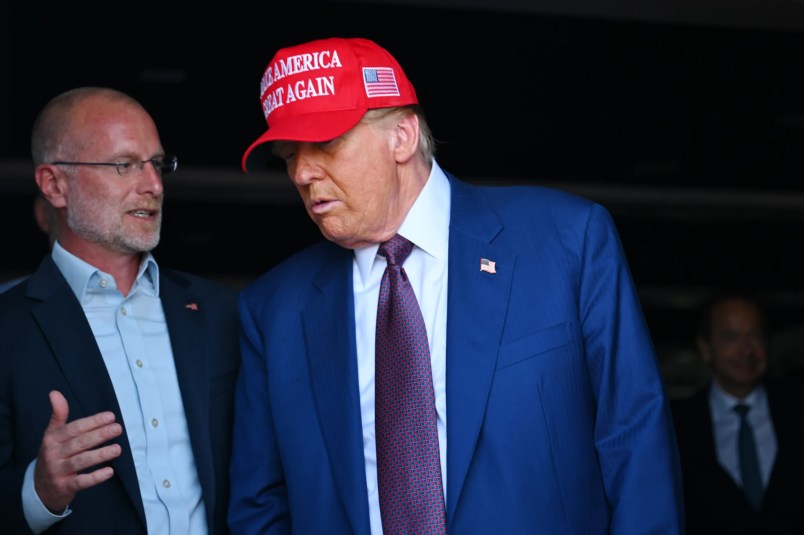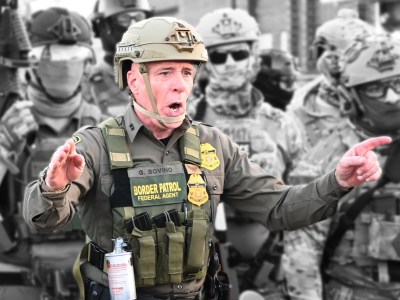You could almost hear the gears turning in Owen Strickland II’s head as he pondered slowly and deliberately whether Jimmy Kimmel should’ve been taken off air in the wake of conservative podcaster Charlie Kirk’s murder.
“Mr. Kimmel started out his life and career as a comedian,” Strickland began. “Somewhere along the lines he morphed a long way away from that, in my personal opinion.”
“Unless there is a dramatic turnaround in the amount of people every night watching his show, he’s gonna get canceled,” he added later.
Strickland is mayor of Bailey, North Carolina, a tiny town of about 560 people, according to the U.S. Census. He’s also chair of the Nash County Republican Party. Politicians in the area often campaign on bread-and-butter issues like poverty, education, and internet connectivity. But the First Amendment matters, too, he said.
“Was it a knee-jerk reaction for Disney? Probably,” Strickland deliberated.
“Should they have taken a breath before they pulled the trigger on it? Probably.”And that’s where he ultimately landed.
Kimmel returned to about 80% of the nation’s ABC stations on Tuesday night after what Disney described as “thoughtful conversations” with the host. Disney brought the program back to its ABC stations, but Sinclair and Nexstar, which operate dozens of ABC affiliates across the country, have not. In his highly-anticipated opening monologue, Kimmel skewered Trump and Federal Communications Commission Chair Brendan Carr, and made clear his belief that his First Amendment rights had been violated.
“Our government cannot be allowed to control what we do and do not say on television, and we have to stand up to it,” Kimmel said.
The Kimmel debacle has had top Trump officials and some allies in Congress and the media tripping over themselves to call for restrictions on speech. Some have since backtracked, as they knock against the Republican Party’s own stated commitment to the First Amendment. As these MAGA elites muddle their way through the delicate balancing act of protecting hate speech and silencing conservative opponents, TPM reached out to local GOP leaders and Trump voters in battleground states with competitive upcoming midterms to see how the conversation is landing.
“I don’t think that speech should be weaponized, but I also think that there is a very lax standard about what is considered true,” said Ben Hickinbotham, a chief executive officer at a firm that contracts with the government from Kennett Square, Pennsylvania. “I don’t believe it is the job of any administration to police that necessarily. But,” he said, “in fairness, there were lots of people on the left saying the same thing eight months ago about policing hate speech and how it shouldn’t be protected so what I think it’s more indicative of is people losing perspective on the importance of speaking freely.”
Last week, Attorney General Pam Bondi sought to distinguish between protected speech and hate speech during a podcast appearance, warning the latter was punishable by the government. It’s not, and conservative mainstays like Tucker Carlson and Ben Shapiro quickly acknowledged as much.
Even Carr of the FCC, whose comments on a podcast led to the suspension of Kimmel’s show, has tried to downplay the significance of his thinly-veiled “we can do this the easy way or the hard way” threat to ABC networks last Wednesday.
Kimmel read Carr’s full comments to right-wing podcaster Benny Johnson on air Tuesday night, along with a 2022 tweet from Carr calling political satire “one of the oldest and most important forms of free speech” and acknowledging the reasons people in power seek to censor it.
“In addition to being a direct violation of the First Amendment ,” Kimmel said of Carr’s threat, “it’s not a particularly intelligent threat to make in public.”
Carr on Monday tried to distance his comments from broadcasters’ actions against Kimmel. And Bondi completely walked back her threats to prosecute Americans for hate speech following swift, strong bipartisan pushback. But Trump is leaning into the fight, threatening to “test” ABC’s partisan leanings.
Despite the president’s willingness to put himself at the center of this conversation, his voters are downplaying Trump’s role and justifying what scholars have cited as a dangerous violation of constitutionally protected speech.
“I think, yes, some things should be censored in my opinion,” Thomas Gianchetti, a retired union tradesman and Trump voter from Aston, Pennsylvania, said. “Especially things that are on national TV, on national news, that civilians watch for information.
“Not that it matters, because Kimmel wasn’t censored for his comments,” Gianchetti continued. “His ratings are shit,” he said, echoing statements made Monday by Carr. “They’re losing more money and Trump didn’t have him [taken off air]. He was taken off the air by their investors and by their satellite companies.”
Kimmel in the second quarter of 2025 netted 1.77 million viewers, falling in the middle of the pack between The Late Show with Stephen Colbert (which was taken off CBS after Colbert criticized Paramount for settling a legal case with Trump) and The Tonight Show Starring Jimmy Fallon.
Gianchetti may be articulating a widely held take among Republican-voting Americans. A recent YouGov poll found that 73% of Republicans approve of Kimmel being taken off the air, but only 30% say that it is acceptable “for the government to pressure broadcasters to remove shows that include speech it disagrees with.”
But there are also the Trump hardliners: those who aren’t at all concerned about addressing any contradictions that exist between the right’s claimed embrace of freedom of speech and the Trump administration’s open attack on it.
“Of course, we live and fight for the First Amendment and, of course, all the other amendments,” said a Cochise County, Arizona, Republican Committee volunteer who didn’t feel comfortable sharing their name. “We don’t really give a rip about Jimmy Kimmel,” the person continued, “and none of us believe that the president is doing anything wrong about it.”
The contradiction that seems to present itself between the GOP’s self-image as the party of anti-woke free speech and the second Trump administration’s recent actions isn’t so stark upon closer inspection, said Mary Anne Franks, a legal scholar and professor in tech policy and civil rights at George Washington University.
“If you think about what conservatives have really been saying pretty consistently for 20 years, they’ve been saying, ‘We don’t like it when liberals control the discourse,’” Franks, a First Amendment scholar, told TPM.
Conservatives, said Franks, were quick to claim censorship when college students protested against right-wing speakers visiting campuses.
“So what we’re seeing now is that kind of mask-off moment to say, ‘What we meant by protecting free speech was always conservative speech,” said Franks. “What we meant by censorship is, someone who’s anti-conservative or doesn’t support conservatism, we always call them censors.”
In Strickland’s small-town government, he says honoring constituents’ freedom of speech at in-person meetings is a unifying force holding commissioners with different political opinions together. Beyond that, a line might need to be drawn somewhere.
“It’s one thing to call someone a jerkface… Calling them the most heinous dictator that’s ever lived, as far as I’m concerned, is a totally different ballgame,” he said.





